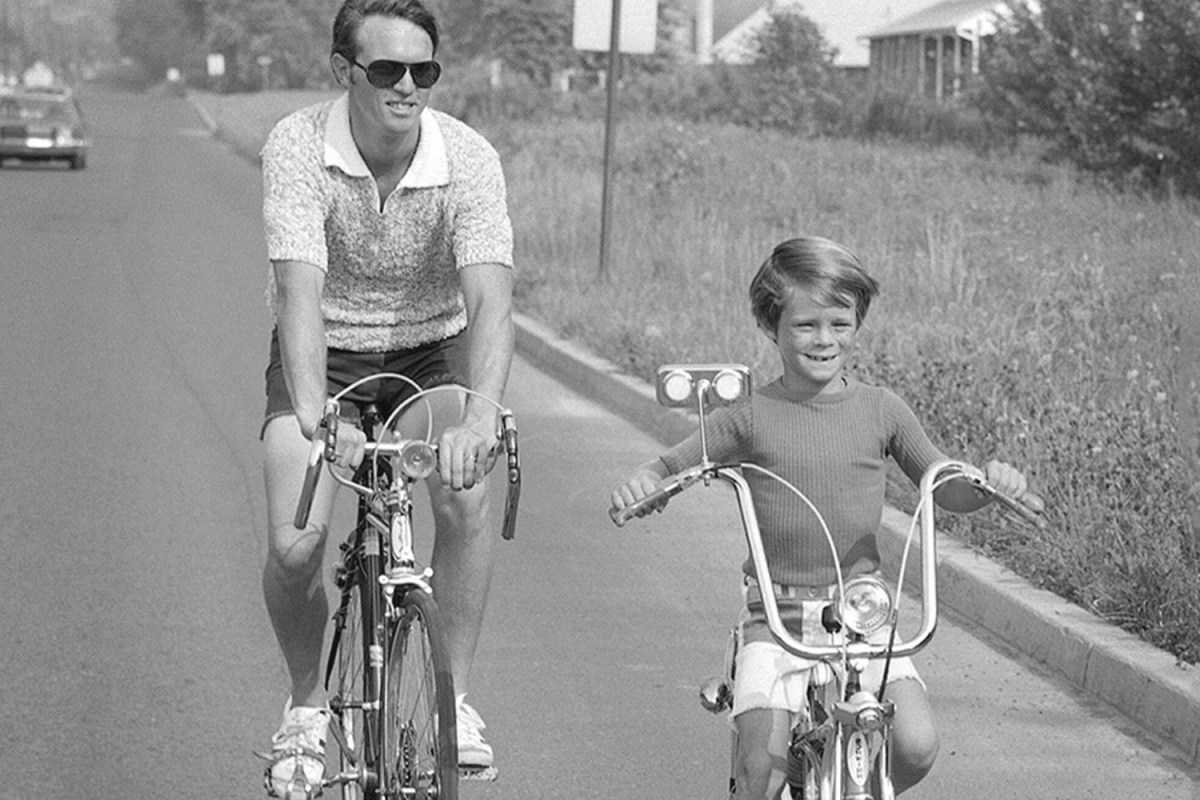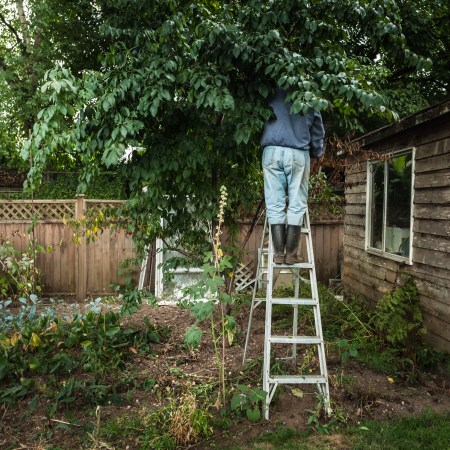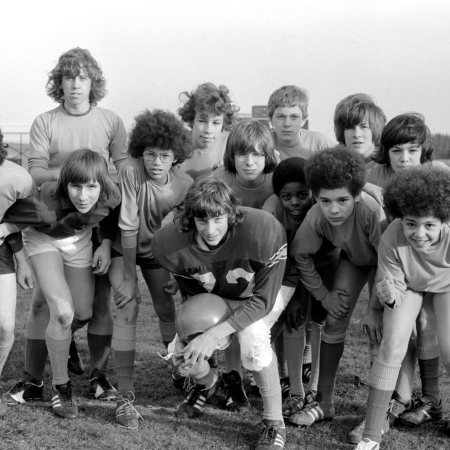Within six months of Dr. Jonathan Bratjbord welcoming his first child into the world, he’d gained 20 pounds. The urologist remembers a fateful hike with an old medical school buddy in Northern California, when his friend stopped their ascent to ask if it was prudent for them to continue. “I remember asking him why,” Dr. Bratjbord says. “He said I looked like I was going to have a heart attack. He took a picture and showed me. I was beet red in the face, my shirt was soaked through with sweat and my gut was hanging out of my shirt.”
It was quite the fall from grace for Dr. Bratjbord, who’d played football in college and spent years going to the gym for at least two hours a day. But his old rhythms were no match for the shock of fatherhood, and the many sleepless nights, poor dietary choices, financial stressors and seemingly never-ending tasks that arrived with it.
Parenting surveys have indicated that young dads lose an average of 109 minutes of sleep each night. Morning grogginess rules out morning workout classes; afternoon crashes leads to high-starch snacks and fatty dinners. Eventually, your kids figure out how to sleep through the night. But how do you figure out how to reclaim the healthy habits you lost along the way?
The Emotional and Physical Toll
New fathers face a rash of difficulties that they rarely discuss out loud, for fear of either upsetting an outdated paradigm — that of the dutiful, discipline-oriented “man of the house,” who can meet the task at hand (keep this baby alive and happy!) without complaint — or upsetting their hard-working, equally-exhausted partner.
But consider: paid paternity leave is abysmal in the United States, postpartum depression affects 10% of fathers and negotiating/budgeting free time with one’s partner can put thorns in a relationship (just as emotions are riding high and physical intimacy is under an indefinite moratorium). Cycling from work tasks to baby tasks to another dubious night’s sleep — at a time when seeing a concert or attending running club isn’t an option — can sometimes usher in an era of loneliness that’s far more powerful than most dads feel liberated to admit.
There’s a deeply depressing Reddit post, uploaded four years ago, that pokes at this reality. Under the heading “Loneliness as a father,” the user wrote at the time: “And now, at 2 a.m. with my wife on a night shift and a screaming child that won’t go back to sleep, I feel more alone than ever. We’re having to take the cry-it-out approach because frankly nothing else has worked with him, but even this doesn’t seem to be getting us far. It leaves me back to questioning why I ever became a dad, as someone who up until I met my wife had zero interest really in becoming one. I’d never ruled it out but just never really been bothered about it either.”
Probing the realities of young fatherhood doesn’t have to signify a repudiation of the wonders of raising a child. It can be a necessary acknowledgement that adjusting to life with a kid is hard. It’s hard on the body, and on the brain…which makes the whole affair even harder on the body.
Outlets for socialization and exercise are critical — for mood, for creative thinking, for productivity, for energy, for heart health, you name it. But when confronted with a new status quo that seems to be conspiring directly against activities that were once readily available, it’s easy to see how dads start to slot their personal well-being somewhere on the spectrum between uninspired and hopeless.
Reframing Exercise for the Young Dad
Young dads aren’t doomed to wind up with dad bods, though. As with any big life change, the arrival of a child shouldn’t mean giving up; it should just compel a shift in perspective and approach. It’s very possible for fledgling fathers to burn calories like they once did, they just need to be exacting, patient and innovative in their new (and admittedly compressed) relationship to fitness.
That might start by reframing one’s idea of what an exercise routine should even look like. Dr. Bratjbord, for instance, eventually lost those 20 extra pounds. “The biggest challenge for me, and I think a lot of new dads, is time,” he says. “When I played college football, my workouts would take two hours. I carried around this belief that if I didn’t have two hours to spend in the gym then it wasn’t worth going. But then I started doing HIIT-type workouts and realized that mentality was total BS. They provided me with both strength and cardio components. I was able to get an awesome workout in only 20 to 30 minutes. ”
Like any other dad with a newborn, Dr. Bratjbord wasn’t getting a full eight hours. But he decided to start working out before dawn nonetheless. “The morning became my time. During my last year as a resident in San Francisco, I went to my first early morning CrossFit class and loved it. I was terrible, but I could see that these were my type of workouts. When I moved to Massachusetts a friend brought me to the local CrossFit gym. I went to that 5:30 a.m. class for years…Our kids were all terrible sleepers so it was hard to make myself get up and move my body in the morning. But I would say to myself: you’re still going to feel pretty crappy after not sleeping much during the night, but you’ll feel worse if you don’t get up and work out. The extra 30 minutes of sleep won’t do much for your sleep deprivation, but 30 minutes of working out can be a total game-changer for your mood and energy. It didn’t always work to get me out of bed, but it definitely helped.”
Crucially, Dr. Bratjbord didn’t concoct this plan on his own. He says that he felt “really selfish” at first, telling his wife he needed a half hour to work out in the morning. But they initiated a system where they traded off hours of free time in the morning, so one of them was always available to help the kids.
This system appears to be universal — it’s helped Dev Chakravarty, who works at a real estate agency in London, work his way back to shape while caring for his now nine-month-old daughter. Chakravarty gained seven pounds those first three months (he reports: “after a difficult night with a baby who can’t sleep due to a stuffy nose, you have a medicinal need for pizza”), but has worked to divvy up sleepless shifts with his wife. He sees a personal trainer twice a week, under the understanding that they’ll push a session back if he’s coming off a particularly rough night. “Our daughter has had some sleep regression,” he says, “and started waking up constantly during the night. There have been a few occasions where I have had to reschedule sessions.”
The ultimate key is trust. Open lines of communication with partners and personal trainers ensure that working out doesn’t take on a secretive or adversarial air. It can remain a personal imperative, but is best deployed as a light, flexible one, where teamwork is everything. And that sense of teamwork can even extend to the babies. James Hyslop felt guilty about his running habit when he and his wife first had kids. So he bought the family a decent stroller and started bringing them along.
“When I just had one child, I would put them in the stroller and run with it. My kid loved it and it meant I could keep up running without further burdening my wife. When the second came around, I put our eldest on a balance bike and the younger in the stroller and would do the same. Certainly takes some adjusting to, and may depend on the temperament of the children, but this worked great for me.”
While the majority of American men view exercise as a method for eliminating beer and burger weight, there are many who operate like amateur athletes, and find years of physical exploits — gains in the gym, marathon training, technical concentrations like climbing — suddenly stalled by fatherhood. It’s difficult to step back from a passion (and see less of the friends you’ve made in that world), but a huge part of caring for a child, as most Type A exercisers come to learn, is in lowering their personal expectations. Perhaps the year your son is born isn’t the best year to sign up for a triathlon. The good news? This realization can spawn an appreciation for other, gentler ways to stay in shape.
Charles Rodmell, a running coach, and his wife were both equally into exercise when their firstborn arrived. But aside from occasional trips to go mountain biking in the mountains, during which friends or family would watch their son, they grew to accept that they had entered a different stage in their athletic lives. “It’s not like we were elite athletes trying to podium,” Rodmell says. “We were still competitive, but we didn’t need to do anything more than maintain fitness, even if we wanted more. Accepting that was important.” That meant: less epic trail runs and more loops around the neighborhood. Rodmell also got into the habit of bringing his son to Pilates, where he didn’t cause too much trouble…”most of the time.”
In some cases, dads are able to seek out more intense exercise by trusting that their babies and toddlers are game for adventures. Cooper Mitchell, who runs a popular fitness equipment review site, got into the habit of putting one of his kids “in a sling and pushing a sled or going for a ruck.” And Hyslop decided with his wife early on that their children wouldn’t be the sort who sat with screens all day long. “We do regular family walks and hikes,” he says. “Before either kid reached school they had already climbed up a number of hills and finished some fairly lengthy walks…up to four hours, at most. Kids are fitter than you think and love getting out. When they were quite young we would have them in the front pack or backpack, and when they were ready we would get them walking. Great for them. Great for keeping fit as a dad. ”
Staying in shape in those early years can help men retain healthy habits (or build new ones) that will last well into fatherhood. It can pay massive dividends on the mental side, too, offering dad a reminder that he was a person before he created this new person, and deserves time for self-care. Whatever form that takes — HIIT, rucking, stroller-runs, meditation, etc. — a bit of movement and reflection will likely make him a better, calmer, stronger dad in the long run. (Or at least, a good routine will give him the extra oomph he needs to helicopter his kids over his shoulders, which is always a hit.)
But ultimately, new fathers shouldn’t beat themselves up if they gain a little weight, or lose a few miles-per-hour on their figurative fastballs. Take it from Rob Wagener, who, as a Certified Nutrition Coach with the National Academy of Sports Medicine, has literally made a living out of staying in tip-top shape. Sometimes, life just gets in the way. And that isn’t just okay — that’s sort of the whole point of we sign up for fatherhood in the first place.
“I have three kids,” Wagener says. “There were many birthday cakes throughout the years. Those celebrations with the family always took priority over whatever diet or food goals I had at the time. I’d carry a bit of guilt afterward, but I never felt bad about being present with the kids. Now that I have two kids out of high school and the third is almost 16, I’m much more aware of how fast time goes, and how important it is to be present with the kids while you can. There will always be a gym close by you can visit. That may not be the case with your kids. Your kids won’t remember how many push-ups you can do, but they will remember how many tuck-ins, happy birthdays and hugs you gave.”
The Charge will help you move better, think clearer and stay in the game longer. Subscribe to our wellness newsletter today.
























